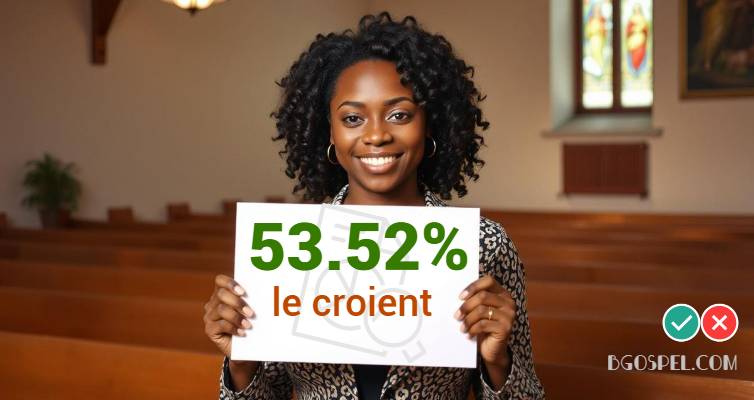Perception of churches and expectations of the public: 53.52% believe it.
An online survey conducted by BGospel Magazine from March 7 to April 20, 2025, sponsored by Dradi Media, reveals that more than half of the participants perceive the churches as commercial enterprises, while a majority claim to believe firmly in God and feels well informed about the finances of their church. This survey highlights the perception of the public on the social mission, financial management and spirituality within the churches, with nuanced results which invite reflection on transparency and community engagement.
In a context where the place and the role of churches in society arouse many debates, this survey aimed to collect the opinion of the public, without distinction of belief, on the perception of churches, their social commitment, the management of the tithe and financial transparency. The objective was to identify major trends and expectations concerning the spiritual and social mission of churches, as well as their internal management.
Made with a large audience, without specific selection criteria, the survey was released online over a six -week period. The questions, with a true or false tendency, focused on the perception of churches as companies, their social involvement, spiritual teaching, faith, belonging to a local community, the motivation to give tithing and access to financial information.
Survey results and improvement axes
The results show that 53.52% of respondents consider churches as commercial enterprises, while 46.48% reject this idea. In addition, 64.79% believe that churches mainly help people in need, against 35.21% who think the opposite. Teaching focused on terrestrial wealth is a minority perceived as dominant (38.03%), the majority (61.97%) believing that the living skills remain at the heart of the message. Faith remains very anchored, with 95.77% of participants claiming to believe firmly in God, and 88.73% declaring themselves members of a local church. Only 19.72% say they give the tithe by obligation, against 80.28% which do it freely. Finally, 57.75% feel informed of their church spending, while 42.25% express a lack of transparency.
The analysis of these data highlights an ambivalent perception: if the majority recognizes the social commitment and the financial transparency of the churches, a significant part remains critical as to their functioning, sometimes assimilating them to businesses. Strong membership in faith and the local community contrasts with doubts about tithing management and access to financial information. These results underline the importance of strengthening communication and transparency within churches, while valuing their social role.
Churches are recommended to accentuate their efforts of financial transparency and communication with their members, while continuing their social commitment. Highlighting the concrete actions carried out at the service of the community and clarifying resources management could help improve their image and public confidence.
In conclusion, this survey highlights strong expectations in matters of spirituality, transparency and social commitment. He invites the churches to continue their mission while responding to the concerns of contemporary society. The detailed questionnaire and raw data are available on request, in order to allow in -depth analysis or use for research purposes.



